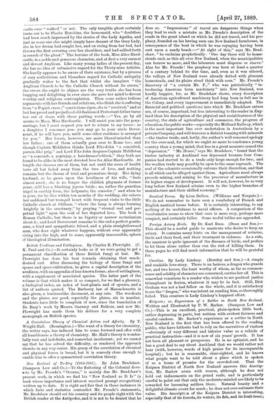New Zealand of To - Day (1884 - 1887). By John Bradshaw. (Sampson Low
and Co.)—To the fluttering of the Colonial dove- sots by Mr. Froude's " Oceana," is mainly due Mr. Bradshaw's present work, in which we find his "New Zealand as It Is" (a book whose importance and interest received prompt recognition) written up to date. It is right and fair that in those instances in which facts and statistics contradict Mr. Froude's statements, Mr. Bradshaw should set his country and its people right with the British reader at the Antipodes, and it is not to be denied that he does so. " Impressions " of travel are dangerous things when they lead to such a mistake as Mr. Froude's description of the
roads in the great island on which he did not travel, and his pro- phecy, founded on his having seen one New Zealand farmhouse, in consequence of the boat in which he was voyaging having been cast upon a sandy beach :—" At sight of this," says Mr. Brad- shaw, " he exclaims prophetically : One day there will be home- steads such as this all over New Zealand, when the municipalities can borrow no more, and the labourers must disperse or starve.' Alas for Mr. Fronde ! the prophecy was born at least a quarter of a century behind its due time, and, even as it was uttered, the valleys of New Zealand were already dotted with pleasant homesteads, and its plains stood thick with corn." Mr. Froude's discovery of " a certain Mr. F.," who was patriotically " in- troducing American farm machinery" into New Zealand, was hardly happier, for, as Mr. Bradshaw shows, every description of American agricultural machinery had long been in full use in the Colony, and every improvement is immediately adopted. The financial and political questions into which Mr. Bradshaw enters are, of course, important, but less interesting to the reader in Eng- land than his description of the physical and social features of the country, the state of agriculture and commerce, the progress of education, the public works—especially the Midland Railway, which is the most important line ever undertaken in Australasia by a private Company, and will traverse a district teaming with minerals —the timber trade, and, lastly, the author's well-reasoned apology for the over-zeal, for which we ought no more to condemn a young country than a young mind, that has in a great measure caused the "depression." " Mr. Hoare," says Mr. Bradshaw, " found that the timber industry at Auckland was depressed because four Com- panies had started to do a trade only large enough for two; and the woollen trade may possibly be open to the same reproach. The zeal of the colonists occasionally outruns their discretion, and that is all which can be alleged against them. Agriculture must always precede mining, and mining be the precursor of manufacture in its higher stages of development. It will not, however, be so very long before New Zealand attains even to the higher branches of manufacture and their skilled economy."


































 Previous page
Previous page